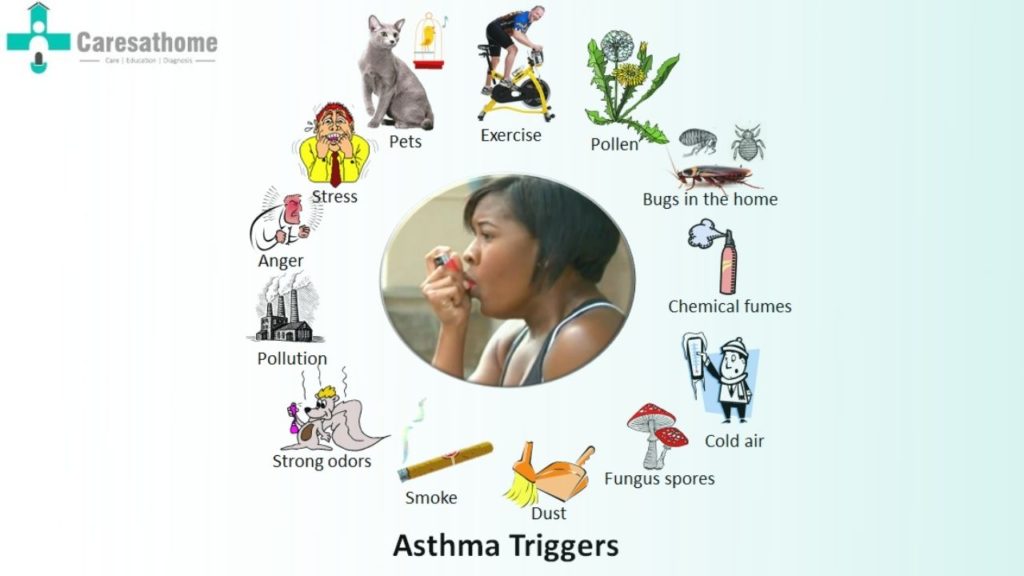Understanding Asthma Triggers and How to Manage Them
Asthma is a chronic condition that affects the airways, causing difficulty breathing and triggering symptoms such as wheezing, coughing, shortness of breath, and chest tightness. These symptoms can often be triggered by a variety of factors, known as asthma triggers. Identifying and managing these triggers is key to controlling asthma and preventing flare-ups.
Here are some of the most common asthma triggers:
1. Allergens
Allergens are one of the leading causes of asthma flare-ups. These include:
- Pollen: Trees, grasses, and weeds release pollen that can cause allergic reactions in many individuals.
- Dust Mites: Tiny organisms that thrive in warm, humid environments, often found in bedding, carpets, and upholstery.
- Pet Dander: Proteins found in the skin cells, saliva, and urine of animals, particularly cats and dogs.
- Mold: Mold spores in damp areas can trigger asthma symptoms, especially in homes with high humidity.
- Cockroach Droppings: Exposure to cockroach allergens can cause asthma symptoms to worsen.
2. Air Pollution
Pollutants in the air, such as smoke and industrial fumes, can severely irritate the lungs and airways, triggering asthma attacks. Common air pollutants include:
- Cigarette Smoke: Smoke from tobacco or marijuana can aggravate asthma symptoms.
- Vehicle Exhaust: Car emissions contribute to air pollution, especially in urban areas.
- Chemical Fumes: Strong odors from cleaning products, paints, or industrial chemicals can trigger asthma in sensitive individuals.
3. Weather Conditions
Certain weather conditions can worsen asthma symptoms. Cold air, dry air, and high humidity are all known triggers. For example:
- Cold Air: Cold, dry air can cause the airways to constrict, making it harder to breathe.
- Humidity: Both high and low humidity levels can affect asthma. Humid conditions encourage mold growth, while dry air can irritate the airways.
4. Respiratory Infections
Respiratory infections like the common cold, flu, and other viral infections can exacerbate asthma symptoms. These infections cause inflammation in the respiratory system, making it more difficult to breathe.
5. Exercise
While exercise is generally good for overall health, it can sometimes trigger asthma symptoms, especially in cold or dry environments. This is known as exercise-induced bronchoconstriction (EIB). Individuals with asthma may experience wheezing, coughing, or shortness of breath during or after physical activity.
6. Strong Odors and Chemicals
Exposure to strong smells can be a significant asthma trigger. Some common culprits include:
- Perfumes and Fragrances: Strong fragrances from perfumes, air fresheners, and candles.
- Cleaning Products: Many household cleaning products contain chemicals that can irritate the airways and trigger asthma attacks.
7. Stress and Emotional Factors
Stress, anxiety, and even intense emotions like laughter can lead to hyperventilation and constriction of the airways, triggering asthma symptoms. Managing stress through relaxation techniques, deep breathing, and mindfulness can help reduce this risk.
8. Medications
Certain medications can trigger asthma symptoms or make them worse. Some asthma patients may be sensitive to:
- Beta-blockers: Typically used to treat heart conditions and high blood pressure.
- Aspirin and NSAIDs: These can cause a reaction in some asthma patients, leading to asthma attacks.
9. Food Allergies
Certain foods can trigger allergic reactions in people with asthma. Foods like shellfish, peanuts, and dairy can sometimes cause asthma symptoms. In addition, some foods may contain additives such as sulfites (found in wine and dried fruits), which can aggravate asthma.
How to Manage Asthma Triggers
Managing asthma is a multi-step approach, which involves:
- Identifying Your Triggers: Keep track of when your symptoms occur and note possible triggers.
- Medication: Take your asthma medication as prescribed. This may include inhalers or other medications to prevent or relieve symptoms.
- Avoidance: Whenever possible, avoid or minimize exposure to known triggers. This could mean using air purifiers, keeping pets out of certain rooms, or avoiding outdoor exercise during high pollen days.
- Lifestyle Modifications: Stay hydrated, maintain a healthy diet, exercise regularly, and manage stress levels.
- Regular Check-ups: Visit your doctor regularly to ensure your asthma is well-controlled and discuss any changes in your symptoms.
By understanding asthma triggers and working with your healthcare provider, you can manage your condition and enjoy a better quality of life.

